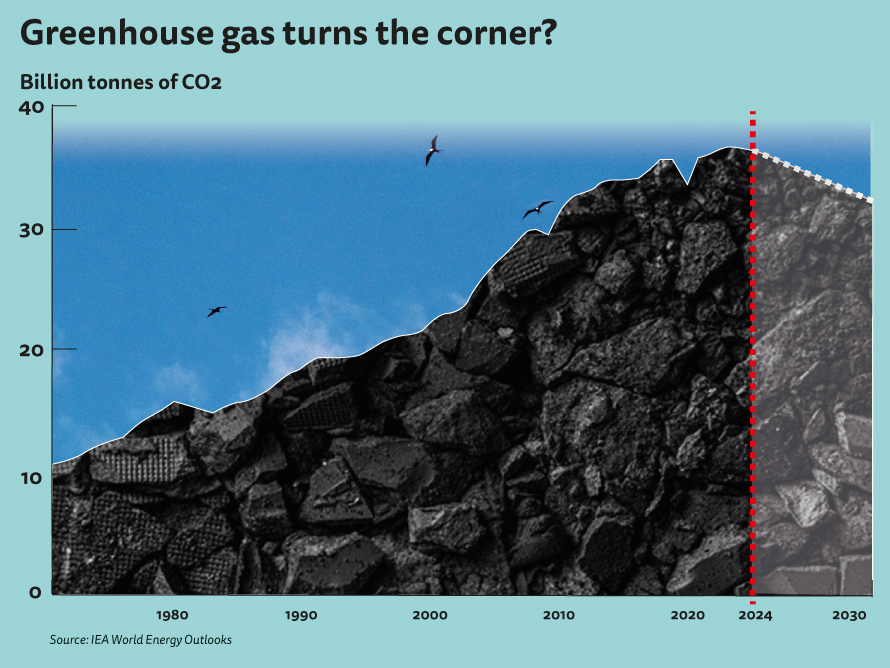So can we be climate optimists? In 2024, we could see a decline in global carbon emissions for the first time in history — and years ahead of schedule. It sounds too good to be true.
This could be the year... global CO2 reduces
So can we be climate optimists? In 2024, we could see a decline in global carbon emissions for the first time in history - and years ahead of schedule. It sounds too good to be true.
Thin ice
What were your new year's resolutions? Perhaps you decided to eat more vegetables, or stop doing your homework last-minute. Perhaps you decided to start a new sport or read more books.
Whatever they were, we have one new year's resolution to share: getting our planet back into shape. 2023 was the hottest year on record. And despite our efforts, the year saw a 1% increase in emissions from burning fossil fuelsFuels made from decomposing plants and animals, including coal, natural gas and oil. These fuels release carbon dioxide, causing global warming. compared to 2022.
2024 could be different. Experts think that this could be the first year on record where we see an overall fall in greenhouse gasGases in the Earth's atmosphere that trap heat, contributing to global warming. Carbon dioxide, methane, nitrous oxide and water vapour are all greenhouse gases. emissionsThings that are released, such as gases, as part of a process. E.g. greenhouse gases. , two years ahead of the schedule predicted by the IEAInternational Energy Agency.'s World Energy Outlook.
It is an achievement which inspires some optimismHaving a hopeful and positive outlook. . The shift has been caused by a number of factors, including the popularity of electric vehicles1 and the success of renewableEnergy sources, such as wind and solar power. energy.
This could make 2023 the year that greenhouse gas emissions peakedReached its highest point. . Perhaps the worst is behind us.
The energy sector is to blame for around three-quarters of global greenhouse emissions. But some of the world's largest economies have brought renewable energy growth to an all-time high.
Fossil fuels now make up less than half of China's power capacity, whilst renewable energy will generate more than a quarter of US energy this year.
Reducing our carbon dioxide emissions is central to the fight against global warming. CO2 is a greenhouse gas which traps heat in our atmosphere to keep the planet warm. But when levels of CO2 get too high, the Earth's temperature warms up too much, disrupting the Earth's natural climateThe weather over a long period of time. .
But even if 2024 does go down in history as the year we finally kicked emissions growth, experts advise that it is only a first step. It is increasingly unlikely that we will hit the 1.5C warming target set by the Paris Agreement in 2015 to avoid the deadliest effects of climate change.2
So can we be climate optimists?
Yes: The trajectoryThe path or progression that something follows forward. is clearly positive and there is much to celebrate. We have mobilised the world's largest economies to fight back against climate change, and as a result renewable energy is thriving.
No: It is clear that we are going to miss the most essential and symbolic climate target of our time. Everything we are doing is too little, too late.
Or... There is little cause for being a climate optimist after last year's cascade of broken climate records. However, it is essential that we do not give up hope entirely: everything we can do right at this point will save countless lives.
Keywords
Fossil fuels - Fuels made from decomposing plants and animals, including coal, natural gas and oil. These fuels release carbon dioxide, causing global warming.
Greenhouse gas - Gases in the Earth's atmosphere that trap heat, contributing to global warming. Carbon dioxide, methane, nitrous oxide and water vapour are all greenhouse gases.
Emissions - Things that are released, such as gases, as part of a process. E.g. greenhouse gases.
IEA - International Energy Agency.
Optimism - Having a hopeful and positive outlook.
Renewable - Energy sources, such as wind and solar power.
Peaked - Reached its highest point.
Climate - The weather over a long period of time.
Trajectory - The path or progression that something follows forward.
This could be the year… global CO2 reduces
 Hot topic: Scientists think 2023 could go down in history as the peak in our greenhouse gas emissions.
Hot topic: Scientists think 2023 could go down in history as the peak in our greenhouse gas emissions. Glossary
Fossil fuels - Fuels made from decomposing plants and animals, including coal, natural gas and oil. These fuels release carbon dioxide, causing global warming.
Greenhouse gas - Gases in the Earth's atmosphere that trap heat, contributing to global warming. Carbon dioxide, methane, nitrous oxide and water vapour are all greenhouse gases.
Emissions - Things that are released, such as gases, as part of a process. E.g. greenhouse gases.
IEA - International Energy Agency.
Optimism - Having a hopeful and positive outlook.
Renewable - Energy sources, such as wind and solar power.
Peaked - Reached its highest point.
Climate - The weather over a long period of time.
Trajectory - The path or progression that something follows forward.
